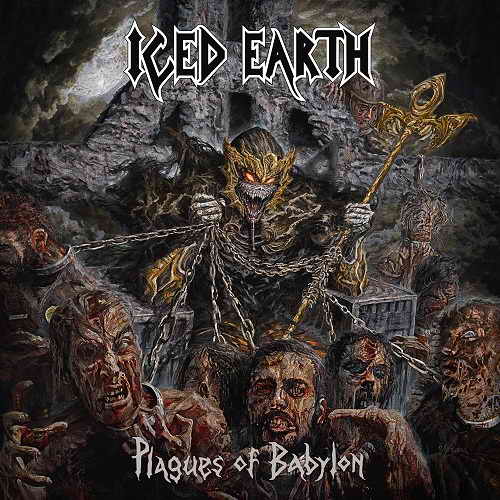A lukewarm disease is spreading. - 58%
For the sake of full disclosure, the author of this review feels it necessary to qualify his position regarding one of the best known acts in power metal at present, namely that he doesn't really consider Iced Earth a power metal band. From their inception in the 80s, they always tended more towards the thrash metal side of the coin, only exhibiting hints at the tonality and melodic cliches typical to Iron Maiden, which were equally explored in the seminal works of Megadeth, a band that is never associated with power metal. Having said that, ascribing a level of power metal influence could be appropriately done when considering the latter day works of Iced Earth, namely everything following The Dark Saga and particularly material that came out of the short-lived time when Ripper Owens was leading the fold.
This may seem like a trivial distinction in terms of metal style given that power metal and thrash metal have a common heritage insofar as the NWOBHM and the early speed metal scenes in Canada and Germany are concerned, but it definitely reveals how albums like Something Wicked This Way Comes, The Crucible Of Man and the recently released Plagues Of Babylon function in contrast to their seminal early works. With this sort of odd niche comes a riffing style that is highly reminiscent of the percussive, heavily rhythm based approach of several Bay Area bands, but superimposed upon a much simpler songwriting style that usually comes with a very different chord progression approach. What results is somewhat comparable to Metallica's controversial 1991 self-titled album, although Jon Schaffer never ended up taking the alternative rock pill.
All things considered, writing a watered down version of thrash metal with a power metal format doesn't necessarily lead to overt drudgery, but it definitely limits the number of possibilities pretty sharply. In this album's case, what results is something that sounds like a slower, more contrived version of Something Wicked This Way Comes. The songs sound heavily similar to each other, despite some noticeable changes in structure and jumps in tempo, and the production quality veers slightly into that overly smooth distorted quality where the drums are just a bit too loud and the guitars don't have the necessary punch to make those minimalist thrash riffs truly shine. This is particularly noteworthy on the opening title song, which proves to be one of the better offerings on here despite its long length and very gradual progression. The riffs just come off as stagnant and lacking power, but the extremely catchy principle melody and Stu Block's vocal performance manages to salvage things to a fair extent.
As the album unfolds, it gets a bit difficult to distinguish songs as the format doesn't seem to evolve all that much. Things are moderately enticing on the second offering "Democide", which plays up the thrash angle pretty strongly and manages to keep things up tempo and dynamic. Similarly, "Resistance" also listens more like a late 80s thrash metal offering, but through more of a mid-tempo lens with a chorus that sounds moderately similar to something that a Judas Priest oriented German band like Primal Fear would come up with. Much of the rest of what constitutes metal on here varies from being mediocre to mildly annoying, and in usual fashion the monotony of similar ideas is broken up with a sizable number of ballads. "If I Could See You" proves to be the lone true crapper of a sappy ballad fit for rock radio opposite Breaking Benjamin, whereas slightly less offensive half-ballads in "Peacemaker" and "The End" manage to showcase Stu Block's uncanny ability to competently switch between a husky baritone gruff and a squeaky clean croon, but otherwise induce little more than sleep.
The fundamental problem with this album is basically the same one that has dogged this band on and off for the past 18 years, only to a greater degree. It's heavily repetitious, puts way too much emphasis on riff work that does not receive the needed development to stay interesting, and likewise goes just a bit too heavily on the ballads. This is arguably just a tad bit better than the overall failure that was The Crucible Of Man, but it's nestled pretty comfortably in the same overall territory. Whether a tell-tale sign of Schaffer finally running out of ideas, or just another is a growing number of songwriting slumps, it's pretty clear that whatever fire was rekindled on Dystopia has fizzled. Core fans of the band who think that Schaffer can do no wrong may find things to like here, but even they will have to admit a noticeable decline compared to 3 years prior.

